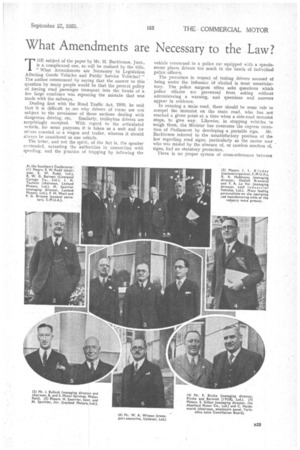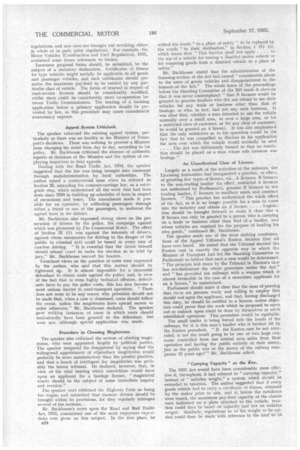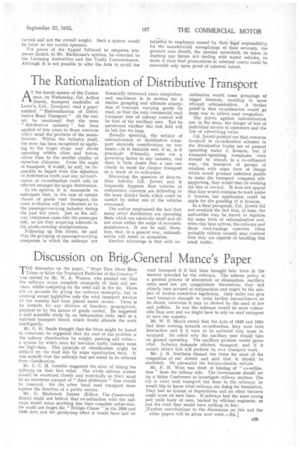What Amendments are Necessary to the Law?
Page 33

Page 34

Page 35

If you've noticed an error in this article please click here to report it so we can fix it.
THE subject of the paper by Mr. H. Backhouse, Jour., is a complicated one, as will be realized by the title, "What Amendments are Necessary to Legislation Affecting Goods Vehicles and Public Service Vehicles? " The author commenced by saying that the answer to this question by many people would be that the present policy of forcing road passenger transport into the hands of a few large combines was repeating the mistake that was made with the railways.
Dealing first with the Road Traffic Act, 1930, he said that it is difficult to see why drivers of trams are not subject to the provisions of those sections dealing with dangerous driving, etc. Similarly, trolleybus drivers are surprisingly excepted. With regard to the articulated vehicle, for some purposes it is taken as a unit and for others counted as a wagon and trailer, whereas it should always be considered as one vehicle.
The letter, and not the spirit, of the Act is, the speaker contended, actuating the authorities in connection with speeding, and the practice of trapping by following the
vehicle concerned in a police car equipped with a speedometer places drivers too much in the hands of individual police . officers.
The procedure in respect of testing drivers accused of being under the influence of alcohol is most unsatisfactory. The police surgeon often asks questions which police officers are prevented from asking without administering a warning, and questions and answers appear in evidence.
In entering a main road, there should be some rule to compel the motorist on the main road, who has not reached a given point at a time when a side-road motorist stops, to give way. Likewise, in stopping vehicles to weigh them, the Minister has overcome the express intention of Parliament by developing a portable sign. Mr. Backhouse referred to the unsatisfactory position of the law regarding road signs, particularly as the motor user who was misled by the absence of, or careless erection of, signs, had no statutory protection.
There is no proper system of cross-references between regulations, and new ones are brought out revoking, either in whole or in part, prior regulations. For example, the Motor Vehicles (Construction and Use) Regulations, 1931, contained some dozen references to brakes.
Insurance proposal forms should, he submitted, be the subject of a statutory declaration. Certificates of fitness for type vehicles might usefully be applicable to all goods and passenger vehicles, and such certificates should prescribe the maximum pay-load to be carried by any particular class of vehicle. The forms of renewal in respect of road-service licences should be considerably modified, whilst there could be considerably more co-operation between Traffic Commissioners. The hearing of a backiug application before a primary application should be prevented by law, as this procedure may cause considerable unnecessary expense.
Appeal System Criticized.
The speaker criticized the existing appeal system, particularly as there was no finality in the Minister of Transport's decisions. There was nothing to prevent a Minister from changing his mind from day to day, according to his policy. Mr. Backhouse criticized the absence of authentic reports of decisions of the Minister and the system of employing inspectors to hear appeals.
Dealing with the Road Traffic Act, 1934, the speaker suggested that the law was being brought into contempt through maladministration by local authorities. The author raised a controversial issue when he referred to Section 25, amending the contract-carriage law, as a retrograde step, which undermined all the work that had been done since 1930 in building up schedules of fares in respect of excursions and tours. The amendment made it possible for an operator, by collecting passengers through either a friend or one of the passengers, to undercut the agreed fares in his district.
Mr. Backhouse also expressed strong views on the persecution of drivers by the police, the campaign against which was pioneered by The Commercial Motor. The effect of Section 35 (1) was against the interests of drive s. against whom summonses for driving to the danger of the public (a criminal act) could he issued in every case of careless driving. " It is essential that the driver himself should attend court to make his election as to trial by jury," Mr. Backhouse warned his hearers.
Trenchant views on the question of costs were expressed by the author, who said that this matter should be tightened up. It is almost impossible for a successful defendant to obtain costs against the police, and, in view of the fact that in even highly technical offences, defendants have to pay the police costs, this has now become a most serious matter to road-transport operators. " There does not seem to be any reason why provision should not be made that, when a case is dismissed, costs should follow the event, unless the magistrates have special reason to order otherwise," Mr. Backhouse declared. The speaker gave striking instances of cases in which costs should undoubtedly have been granted to the defendant, hut were not, although special application was made.
Procedure in Choosing Magistrates.
The speaker also criticized the system of electing magistrates, who were appointed largely by political parties. The speaker tempered his disapproval by saying that the widespread appointment of stipendiary magistrates would probably be more unsatisfactory than the present position, and that a bench of intelligent lay magistrates was probably the fairest tribunal. He declared, however, that, in view of the vital bearing which convictions would have upon an applicant for a haulage licence, " magisterial courts should be the subject of some immediate inquiry and revision."
The speaker next criticized the Highway Code as being too vague, and submitted that tramcar drivers should be brought within its provisions, for they regularly infringed several of the sections. : • Mr. Backhouse's notes •upon the Road and Rail Traffic Act, 1933, constituted one of the most important expesitiohs ever given on this subject. In the first place, he 3324 wished the words " to a place of safety " to be replaced by the words to their destination," in Section 1 (7) (i), which states that "This Section shall not apply to the use of a vehicle for towing a disabled motor vehicle or for removing goods from a disabled vehicle to a place of safety." Mr. Backhouse stated that the administration of the licensing section of the Act had caused considerable alarm to the users of goods vehicles and disappointment to the frainers_of the Act." The whole tenor of the proceedings before the Standing Committee of the Bill made it obvious that it was never contemplated "that B licences would be granted to genuine hauliers who did not intend to use their vehicles for any trade or business other than that of haulage, or who, in fact, had not any such business. It was clear that, whether a man intended to use the vehicle normally over a small area, or over a large area, or for a restricted class of customer, or for any class of customer, he would be granted an A licence. It was also emphasized that the only restriction as to his operation would be the fact that he was compelled to disclose in his application the area over which the vehicle would normally be used . . The Act was deliberately framed so that no restriction should be placed on a man whose sole business was haulage."
An Unauthorized Class of Licence.
Largely as a result of the activities of the railways, the Licensing Authorities had inaugurated a practice, in effect, of granting five types of licence, viz., A licences, B licences to the non-trading haulier (in effect, restricted A licences not authorized by Parliament), genuine B licences to the trading haulier. C licences to ancillary users, and contract licences. " This practice has undermined the whole effect of the Act, as it is no longer possible for a man to come
into the industry and obtain an A licence Legislation should be brought forward to make it clear that a B licence can only be granted to a person who is carrying on a trade or business other than that of a haulier, and whose vehicles are required for the purpose of hauling his own goods," continued Mr. Backhouse.
The speaker made one of the Most striking condemnations of the Appeal Tribunal's Enston decision that we have ever heard. He stated that the Tribunal decided the Enston case in exactly the opposite way in which the Minister of Transport had led the Standing Committee in Parliament to believe that such a case would be determined. "The principle laid down by the Tribunal in Enston's case has revolutionized the whole procedure under the Act" and " has provided the railways with a weapon which is almost invincible in the case of a newcomer applicant for an A licence," he maintained.
Parliament should make it clear that the onus of proving that there are persons ready and willing to employ him should rest upon the applicant, and that, having discharged this duty, he should be entitled to a licence, unless objectors could prove that the work which he proposed to carry out or embark upon could be done by themselves or other established operators. This procedure would be equitable.
The small trader is being forced into the hands of the railways, for it is this man's haulier who is hardest hit by the Enston precedent. "If the Euston case be not overruled, is not the result going to be one or two large concerns, controlled from one central area miles from their operation and having the public entirely at their mercy, just as the public was at the mercy of the railway companies 15 years ago?" Mr. Backhouse asked.
"Carrying Capacity" as the Key.
The 1933 Act would have been considerably more effective if, throughout, it had referred to " carrying capacity," instead of unladen weight," a system which should be extended to taxation. The author suggested that if every goods vehicle had to carry a certificate of fitness, obtained by the maker prior to sale, and if, before the certificate were issued, the maximum pay-load capacity of the chassis were indicated on a plateattached to the vehicle, taketint could then be bated on Capacity and not on Unladen weight. Similarly; regulations' as to the weight to tie 'carried could then be made with reference to the load to be carried and not the overall weight. Such a system would be fairer to the careful operator.
The power of the Appeal Tribunal to subpcena witnesses should; in Mr. Backhouses opinion, be extended to the Licensing Authorities and the Traffic Commissioners. Although it is not possible to alter the Acts to avoid the
injustice to employers caused by their legal responsibility for the unauthorized wrongdoings of their servants, the greatest care should, the speaker submitted, be taken in drafting any 'future Act dealing with motor vehicles, to make it clear that prosecutions in criminal courts could be successful only upon proof of criminal intent.




















































































